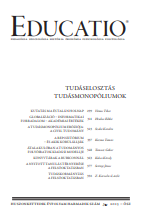A repozitórium – és akik körülállják
University repositories: Their Manifest and Hidden Functions in Hungary
Author(s): Tamás KozmaSubject(s): Education, Library operations and management, Higher Education , Management and complex organizations, Sociology of Education
Published by: Akadémiai Kiadó
Keywords: repository; open access; university management; sociology of science;
Summary/Abstract: University repositories are among the most recent developments in academic life in Hungary. They were created under the notion of the “Open Access movement”, something introduced and organised by the Budapest Declaration (2001) and the Berlin Declaration (2003). The initial idea was that university repositories might help with a free flow of information supporting scientists and researchers, when there would be prompt and easily available publications. After the 2004 R+D and Innovation Act (university copyright ownerships), however, such repositories are not now “free collections” of self-archived intellectual products – rather, they have become mandatory. Today, mandatory repositories function partly as digital libraries for university scientists and researchers, but they are also, in part, tools by which university managements are able to check the research accomplishments of their academicians, as employees.
Journal: Educatio
- Issue Year: 22/2013
- Issue No: 3
- Page Range: 337-347
- Page Count: 11
- Language: Hungarian

